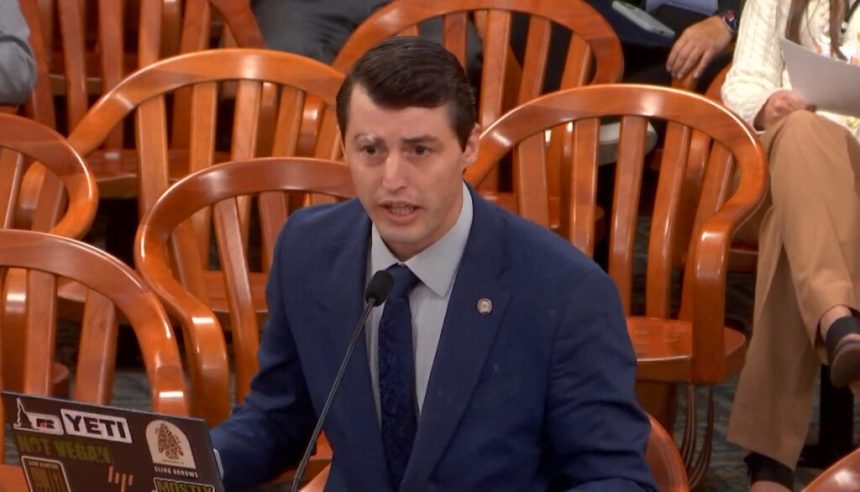Michigan State Rep. Pat Outman (R-Six Lakes) speaks in favor of House Bill 4861, which would change state election law to remove the requirement for non-partisan candidates to declare a party affiliation on their affidavits of identity. Oct. 21, 2025. | Screenshot
The Michigan House of Representatives is considering a change to election law to help non-partisan candidates avoid getting kicked off the ballot due to technicality in the filing process.
Members of the House Election Integrity Committee on Tuesday discussed House Bill 4861, which would remove the requirement for non-partisan candidates to declare a party affiliation on their affidavits of identity.
Lawmakers supporting the bill said the change was necessary because the technicality in question has kept some non-partisan candidates from reaching the ballot based on legal challenges to their affidavits of identity, a document that must be turned in to the Michigan Department of State by the filing deadline in a given election year.
In doing so, we ensure that quality candidates are not excluded from the ballot over a confusing and quite frankly unnecessary paperwork requirement.
– State Rep. Pat Outman (R-Six Lakes)
State Rep. Pat Outman (R-Six Lakes) sponsored the bill. Outman told the committee that candidates for partisan office are required by law to note their party affiliations on the forms by notching one of three check boxes.
The current form does have a box for a non-partisan office without party affiliation, but Outman said judicial candidates have a long-standing tradition of not checking any of the boxes because the non-partisan nature of the race is implied.
That’s led some litigious Michigan residents to challenge those affidavits of identity in court as being incomplete or out of step with election law, which has in turn led to the disqualification of otherwise qualified candidates.
“In fact, the Michigan Supreme Court ruled on this issue in Davis v Highland Park City Clerk, where even [retired Justice David Viviano] pointed out that the law is unclear and urged the Legislature to step in and fix it,” Outman said. “He noted that it makes little sense to force candidates for non-partisan offices to affirm they’re running without party designation when their names already appear in a separate section of the ballot where no party label can appear.”
Outman said the bill was a commonsense change.
“In doing so, we ensure that quality candidates are not excluded from the ballot over a confusing and quite frankly unnecessary paperwork requirement,” he said.
Testifying in support of the bill was Wayne 3rd Circuit Court Judges Kelly Ramsey and Margaret Van Houten.
Ramsey was subject to a legal challenge over her affidavit of identity in 2022, where serial litigator Robert Davis sued over her form being incomplete.
“It subjected me and other members of my bench to considerable stress, aggravation and, quite frankly, financial loss,” Ramsey said. “And it has to do with the fact that I left the line blank regarding party affiliation when I was running for a non-partisan office, and that was the subject matter of the lawsuit. … Had it not been for the [litigant’s] late filing [of the case, which saw it thrown out], I fear I would have been taken off the ballot. We were not successful based on the merits, we were successful in a lawsuit based on [a doctrine determining an unreasonable timing delay].”
State Rep. Stephen Wooden (D-Grand Rapids) said the change makes “ample sense,” but noted that the current form has been updated to allow a non-partisan candidate to check a box indicating that they are running for that office with no party affiliation.
Still, Wooden said it would be wise to change the law for greater clarity, and also to buffer in statute changes that could be made administratively by the executive offices later.
Outman said that was accurate, and it appears the Department of State has corrected the issue on its end. It was still important, Outman added, to make the change in statute.
Supporting the bill but not wishing to speak were representatives from the Michigan Association of Municipal Clerks, the Department of State, the State Court Administrative Office, Pure Integrity Michigan Elections and the Michigan Judges Association.
The committee did not take a vote on advancing the bill.









